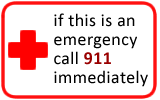Spitting Up - Reflux
Spitting Up - Reflux
Does this describe your child's symptoms? |
Definition
Symptoms
Complications These complications occur in less than 1% of infants:
Cause
Reflux Versus Vomiting: How to Tell
|
If not, see these topics
|
When to Call Your Doctor |
Call Your Doctor Now (night or day) If |
|
|
|
Call Your Doctor Within 24 Hours (between 9 am and 4 pm) If |
|
|
|
Call Your Doctor During Weekday Office Hours If |
|
|
|
Parent Care at Home If |
|
|
HOME CARE ADVICE FOR SPITTING UP (REFLUX) |
Reassurance:
Mild reflux occurs in most infants (50%).
Usually it doesn't cause any discomfort or complications.
Infants with normal reflux do not need any tests or medicines.
Reflux improves with age.
Feed Smaller Amounts:
Skip this advice if age less than 1 month or not gaining weight well.
Bottlefed: Give smaller amounts per feeding (1 ounce or 30 ml less than you have been). Keep the total feeding time to less than 20 minutes (reason: overfeeding or filling the stomach to capacity always makes spitting up worse).
Breastfed: If you have a plentiful milk supply, try nursing on 1 side per feeding and pumping the other side. Alternate sides you start on.
Longer Feeding Intervals:
Formula: Wait at least 2½ hours between feedings.
Breastmilk: Wait at least 2 hours between feedings.
Reason: It takes that long for the stomach to empty itself. Don't add food to a full stomach.
Loose Diapers: Avoid tight diapers. It puts added pressure on the stomach. Don't put pressure on the abdomen or play vigorously with your child right after meals.
Vertical Position: After meals, try to hold your baby in the upright (vertical) position. Use a front-pack, backpack, or swing for 30 to 60 minutes. Reduce time in sitting position (e.g., infant seats). After 6 months of age, a jumpy seat is helpful (the newer ones are stable).
Less Pacifier Time:
Constant sucking on a pacifier can pump the stomach up with swallowed air.
So can sucking on a bottle with too small a nipple hole. If the formula doesn't drip out at a rate of 1 drop per second when held upside down, clean the nipple better or enlarge the hole.
Burping:
Burping is less important than giving smaller feedings. You can burp your baby 2 or 3 times during each feeding.
Do it when he pauses and looks around. Don't interrupt his feeding rhythm in order to burp him.
Burp each time for less than a minute. Stop even if no burp occurs. Some babies don't need to burp.
Expected Course: Reflux improves with age. Many babies are better by 7 months of age, after learning to sit well.
Call Your Doctor If:
Your baby doesn't improve with this approach
Your child becomes worse
And remember, contact your doctor if your child develops any of the "Call Your Doctor" symptoms.
Updated:
March 22, 2017



